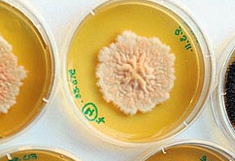In vegetable oil-based biorefineries glycerol is a by-product of the production of biodiesel. This Christian Doppler laboratory (CDL) develops technologies for the microbial conversion of raw glycerine into a wide range of valuable substances.
During chemical conversion of triglycerides from oleaginous plants, e.g. sunflowers, rape or oil palms to biodiesel, about 10% of the vegetable oil remain as glycerine. In the future, especially in Europe, large quantities of glycerine will be generated in the course of efforts to exit from nuclear and fossil-fuel energy. Therefore, there is a need to add glycerine to valuable up-conversion products beyond the current direct use spectrum (in food industry, cosmetics and medicine / pharmaceutical industry). Products which are of interest for industry and can be produced by microbial cell factories comprise basic materials for the production of plastics (1,3-propanediol, 3-hydroxypropionic acid, 2,3-butanediol), solvents and refrigerants (1,3-propanediol, n-propanol) (3-hydroxypropionaldehyde, L-DOPA, amino acids), raw materials for the food industry (e.g. citric acid, sugar alcohols as sweeteners) and substances which can be recycled by biorefineries as raw material (lipids, ethanol, lipases).
In order to pave the way for the production of future products from glycerine, two microbial cell factories are to be characterized. One of these cell factories is the lactic acid bacterium Lactobacillus diolivorans, which has already been successfully used for the production of 1,3-propanediol. Another organism is the yeast Yarrowia lipolytica, which grows very well on glycerine and has an interesting product spectrum.
The area dedicated to Lactobacillus diolivorans within the research program of the CD laboratory deals in particular with the metabolic processes of the microorganism as well as with the research on biopharmaceutical applications. Thus, one focus lies on the redox-state of the cell, which is crucial for the production of various products from glycerine. Furthermore, bacterial microcompartments are characterized, which isolate certain metabolic activities within the cell and thereby enabling targeted biochemical reactions and an increase in efficiency.
The area of the CD lab dedicated to Yarrowia lipolytica is concerned with closing the loop of biodiesel production. Using this yeast, lipids, lipases and alcohols are produced from the waste product glycerol, which can be fed back to the production of biodiesel. Yarrowia lipolytica produces various morphological structures that significantly influence their productivity as a cell factory. Therefore, Yarrowia lipolytica also investigates the link between morphology and productivity.

